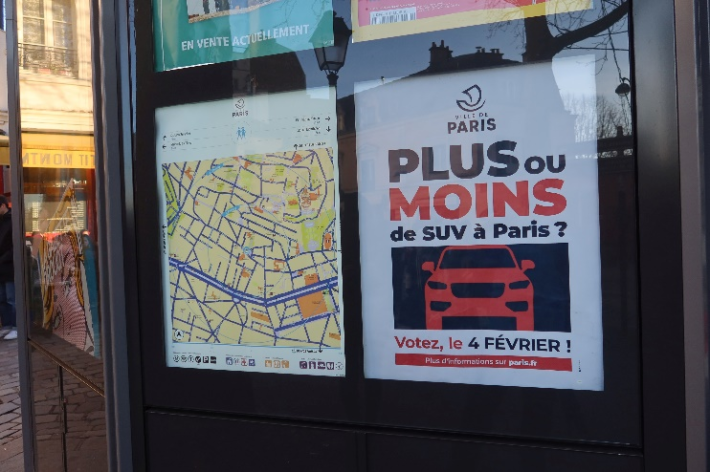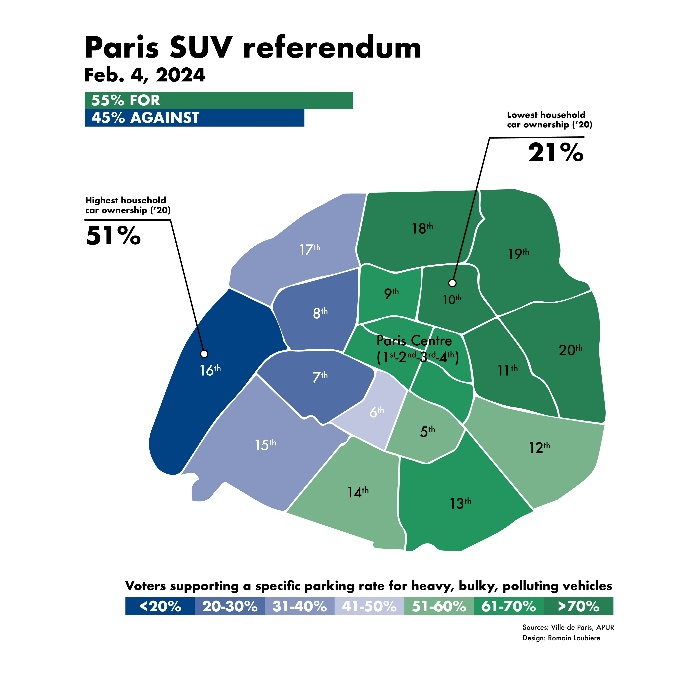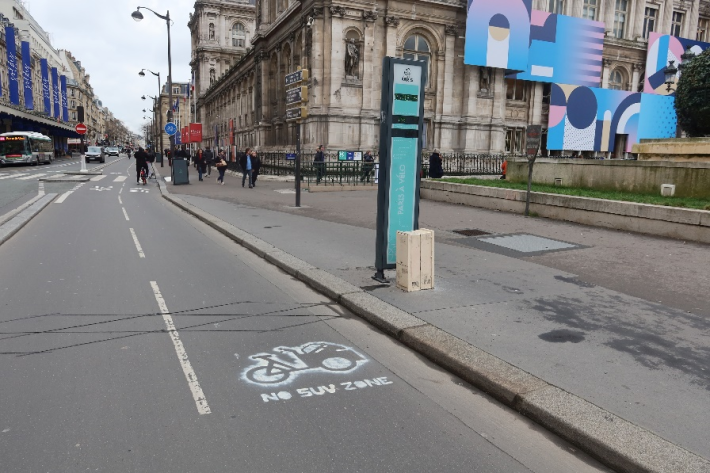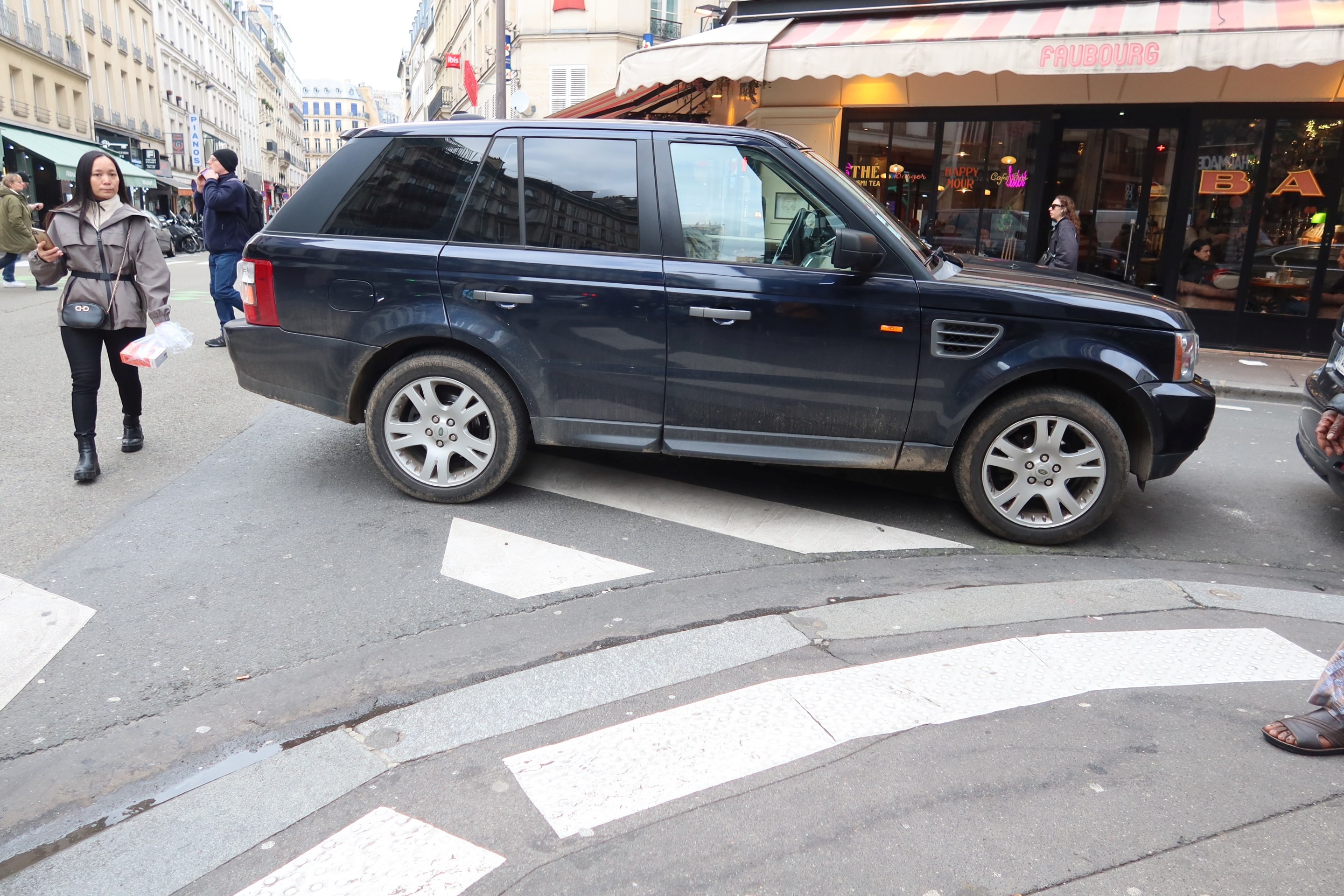By now most Streetsblog readers have probably read that last month voters in Paris took the global street fight over SUVs to a new level. In a bellwether referendum, the “price to park a heavier, bulky, polluting vehicle,” in other words SUVs, was tripled – to 18 euros ($19.90) per hour in the city center and to12 euros ($13.30) in outer neighborhoods (arrondissements in Parisian). With only 10 to 15 percent of private cars impacted, the new fee would raise 35 million Euros annually. For the measure’s lead champion, Paris’s Mayor Anne Hidalgo, the measure is meant to discourage more SUVs from coming into the city, and crowns a decade of incremental steps for de-car (bonizing) Paris’s streets.
The voter turnout was pitifully low (less than 6%), but this was surprising to no one (we’ll address this below). Since the vote was non-binding, the new parking fees must be approved by city officials in May. But the referendum provides political cover for the Paris council to authorize the fees. This is a first of a kind parking fee, and all the world is watching, or should be, to see what Paris does next. In London, Mayor Sadiq Khan already announced that he will monitor the effectiveness of Paris’s plan.
You may have noticed that these days, Paris has had an outsized role in inspiring global sustainable mobility. Cycling is booming and an ambitious regional rail expansion is underway. Paris is one of the most visited cities in the world so every year millions of people are impressed with its walkability, vibrant density and Metro.
Many visitors have likely also observed chronic congestion in the streets, and more recently, a steady rise in the number of SUVs – despite fewer private cars overall. While Paris made strides in reducing private automobiles in the past 10 years the size of new private vehicles has nearly doubled and in France 40 percent of annual new car sales are SUVs – a sevenfold increase from 2013. They block buses and crosswalks, and taller, wider SUVs impair people’s ability to see in their city. Some also point out that SUVs reflect wealthy men dictating street space. 88% of French SUV owners earn over 40k€/year, and 7 out of 10 owners are men.
The February 4th vote on parking fees is not a panacea, but it does inspire a needed pushback against the unfettered proliferation of SUVs. To understand what just happened, we briefly unpack some of the good, bad, and ugly takeaways that arise from Paris’s politically-charged street fight over SUVs.

First the good. The vote was a sharp rebuke against the inequitable escalation in vehicle size, bulk and weight that SUVs have foisted on Paris. It tapped Parisians’ frustration with increased hoarding of public space by SUVs. The emphasis on the footprint of private cars is new on the Paris political agenda, which combined with concern with public safety (especially children and seniors) and global warming, showed especially practical politics. This likely resonated with many voters, and particularly young parents in the city’s left-leaning eastern neighborhoods. To mollify equity concerns over potential working-class impacts, the fee exempts taxis and vehicles used in trades as well as disabled access.
The vote also showed public trust that the political left (socialists, greens, and other smaller parties) can have technical expertise in urban transportation, something severely lacking in the urban left of the United States. For Paris’s political left, the parking referendum is a critical piece of a vision to “de-car” the city for social justice. This vision includes pedestrianizing and greening public squares and streets, citywide 30 km/hour (18 mph) streets, wide, physically separated bikeways, and car-free spaces around schools.
In much of the US, with few exceptions, the political left has forfeited technical expertise about mobility to business, and real estate interests, and offer hollow soundbites about free transit whilst championing a false populism against gas taxes, parking charges, or congestion charging, and offering no vision.
In Paris, echoing a comprehensive de-car policy, three left-leaning sections of the city – the City Center (arrondissements 1-4), and the 10th and 12th arrondissements, each voted in favor of the parking fee increase and in support of “local questions,” which piggybacked on the parking ballot. In these arrondissements voters approved pedestrian, cycling, public realm, and public transport improvements in addition to the parking fee increase.
This is an important takeaway for America’s left-leaning Democrats: You need to develop technical expertise for a comprehensive de-car policy as part of your social justice and climate platform. You will stand out and be taken seriously by voters. Simply patching-together subsidies for the working poor to own cars (and SUVs) such as cheap parking, cheap gas, and little traffic enforcement is only resulting in the working poor being chronically in debt for expensive car payments and making car companies rich. Learn from the left in Paris.
Now the Bad. We’ve already seen that that political left has taken the lead on sustainable mobility in Paris. But Paris’s parking referendum reminds us that the city – like most cities – is geographically divided on the question of mobility, and this is intensely ideological.

Historically, Paris has had a stark class and ideological divide, with wealthy, politically conservative elites in the west and a leftist working class to the east. Now in the former eastern “faubourgs” corresponding to the current 19th and 20th arrondissements, voters overwhelmingly supported the parking fee, but also have far lower rates of car ownership (around 30% of households own a car) and high rates of cycling compared to the rest to the city.
Western Parisians, notoriously capitalist and politically conservative, own more vehicles and drive more, while levels of cycling are low. In the affluent 16th, staunchly against the parking fee increase, over 50% of households own a car. We’ve seen similar maps of the politics of mobility in cities like San Francisco, where maps of the 2022 referendum on car free spaces in Golden Gate Park mirror both car ownership and political ideology. The takeaway is that sustainable transportation, climate, and urban advocates should understand how political ideology shapes mobility.
Meanwhile, with the exception of far right politics in much of the US, almost all spectrums of politics (at least in the global north) have blindly embraced EVs despite a plethora of environmental and social problems associated with them. In the Paris parking referendum, EVs under two tons are exempt from the fee increase, while the weight limit on conventional vehicles will be 1.6 tones. This is wrongheaded. These EVs will be huge, will consume more city space and remain a real safety issue for cyclists and pedestrians.
Rounding out the “bad” in the parking referendum is voter turnout, which was dismal at under 6 percent. Turnout was slightly higher in April 2023 when Parisians voted to eliminate electric for-hire scooters. Out of 1.3 million eligible voters, 78,000 Parisians voted February 4th on a cool, (12℃ / 53.6° F) overcast but dry Sunday. It was not a holiday weekend, Sunday markets were packed, and joggers and cyclists circulated all around Boise de Vincennes and along the Seine and St Martin Canal.
Besides the reality that voter turnout in France has trended downward for the past two decades, we offer a few tentative explanations:
- Parisian voters may have felt that they had already given their opinion when Hidalgo was reelected in 2020. Her de-car policies were clear then and this has been a theme of every mayor’s election since Mayor Delanoë got elected in the early 2000’s. Why were they being asked to chime-in again?
- In line with climate anxiety, among young Parisan voters might have been a feeling that the outcome of a very local election would not change anything. This could be reinforced by the perception that the proposed fee is not very ambitious, with plenty of loopholes and exemptions. For example, SUV owners with a parking permit can pay lower fees to park on a street within their district.
Now we turn to the ugly. The politics of mobility in Europe is looking remarkably similar to the US. Not only has an American-style SUV craze spread across Europe and the world, but with it, a growing politics of mobility rife with resentment, vitriol, and spite. When considering the opposition to raising the Paris parking fee, one must consider that at least some voters had ulterior motives reminiscent of the American right.
In Paris there is a broad spectrum of conservative and right-wing opposition to Mayor Hidalgo which does not necessarily agree on substance but shares a visceral hatred of Hidalgo, meaning transport policy gets entangled with resentment and spite. This is eerily similar to the politics of resentment and spite during the first two years of the Barack Obama Presidency in the US, when his ambitious high-speed rail proposal and proposals to reduce automobile dependency in US cities was met with a furious rage from the right wing, eventually contributing to the build-up of the Tea Party.
Take for example, the 8th arrondissement in Paris, where the right-wing politician Jean d’Hauteserre paired a “local question” on pedestrian spaces and greening with the parking referendum (each arrondissement can do this). Her intent was not walkability. Her political calculus was to piggyback the expected rejection of the parking fee increase by 8th arrondissement voters with popular rage against parking removal for pedestrian and green spaces. She was eager to slow down the reduction of space dedicated to cars in her district, and aware that her electorate would embrace the same mindset. She succeeded by also couching it as a vote against Hidalgo.
In the US, a right-wing politics of resentment, laced with conspiracy theories and false populism has made transport policy-making dysfunctional. From Nashville to the San Francisco Bay Area, right wing elements in politics foment opposition to car reduction policies, going as far as making it illegal for cities to fund them. In Paris some voters in wealthier, more conservative districts were probably not voting about vehicle size or taxes, but against Hidalgo, socialists, greens, and against climate mitigation. The takeaway here is – don’t try to compromise with these right wingers, they are a loud but vocal minority. Push onward for sustainable mobility.

Time is of the essence to futureproof our cities. Space will remain scarce in cities that will become more and more populated in the coming decades while climate change will require adaptation, all the more so as we are no longer on track to comply with the 2° C target of the Paris Agreement. The SUV/Parking fee was a necessary step, but to increase voter turnout and provide broader inspiration, equity, and climate mitigation, it may be time for Paris and peer cities (and the left) to be bolder and go from low-car to truly car-free cities.
***
Jason Henderson is a professor at San Francisco State University on sabbatical in Paris. He is currently researching for a new book on the politics of future mobilities.
Romain Loubière is an Urban Designer Based in Paris
The post Commentary: The Street Fight Over SUVs in Paris appeared first on Streetsblog San Francisco.
The post Commentary: The Street Fight Over SUVs in Paris appeared first on Streetsblog California.






